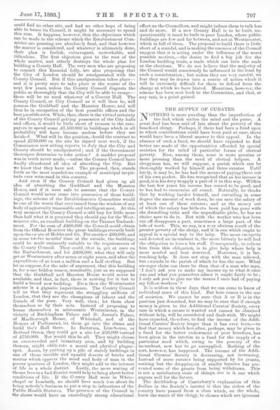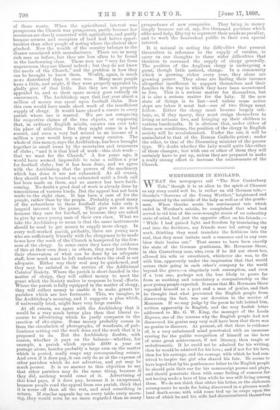THE SUPPLY OF CURATES. N OTHING is more puzzling than the
imperfection of the link which unites the mind and the purse. A great deal has been said of late about the poverty of the beneficed clergy. Perhaps, if there had been a fund open to which contributions could have been paid at once, there would have been a liberal answer to this appeal. In the absence of such a fund, we should have expected to find better use made of the opportunities afforded by special societies for the relief of particular forms of clerical poverty. Now, among these, none is more genuine or more pressing than the need of clerical helpers. A clergyman has, we will suppose, a parish which can be thoroughly worked by himself and three curates. Until lately, it may be, lie has had the means of paying these out of his own pocket. He has recognised that as his income is good, it is his duty to apply a part of it in this way. Within the last few years his income has ceased to he good, and he has had to economise all round. Naturally, he thinks that by working harder himself, and curtailing in some degree the amount of work done, he can save the salary of at least one of these curates ; and as the money out of which the salary has hitherto been paid has gone with the dwindling tithe and the unprofitable glebe, he has no choice save to do it. But with the worker who has been cut off disappears a part, sometimes a large part, of the tale of work. This, we say, is a vc ry obvious result of the greater poverty of the clergy, and it is one which ought to appeal in a special way to the laity. The more energetics and devoted an incumbent is, the more bitterly he will feel the obligation to lessen his staff. Consequently, to relieve him from this obligation, is to give help where help is most needed and best deserved. Moreover, it is far- reaching help. It does not stop with the man relieved, but extends to the parish of which he has the care. What stronger claim can there be than that of a man who says, don't ask you to make my income up to what it once was and what you yourselves admit it ought fairly to he ; I only ask you to give me the means I once had of paying my fellow-workers' ?
It is seldom in these days that we can come to know of individual cases of this kind. But here comes in the use of societies. We cannot be sure that A or B is in the position just described, but we may be sure that if enough money is given to the Additional Curates' Society, every case in which a curate is wanted and cannot be obtained without help, will be considered and dealt with. We might have expected, therefore, to find the income of the Addi- tional Curates' Society larger than it has ever been,—to find that money which hereafter, perhaps, may be given to a fund for the better endowment of poor benefices, has been given in the interim to a fund for the supply of a particular need which, owing to the poverty of the incumbent, now has to go unsupplied. Nothing of the sort, however, has happened. The income of the Addi- tional Curates' Society is decreasing, not increasing. In stead of more curates being supported by its grants, nothing but the dropping-in of sundry legacies has pre- vented some of the grants from being withdrawn. This is not a satisfactory state of things, nor is it one which augurs well for the future.
The Archbishop of Canterbury's explanation of this decline in the Society's income is that the riches of the country have passed from a class which, on the whole, knew the wants of the clergy, to classes which are ignorant of those wants. When the agricultural interest was prosperous the Church was prosperous, partly because her resources are closely connected with agriculture, and partly because owners and occupiers of land had better oppor- tunities than other people of noting where the clerical shoe pinched. Now the wealth of the country belongs to the classes associated with manufactures. There are as many rich men as before, but they are less often to be found in the landowning class. These men are " very far from ungenerous, they are liberal indeed ; but they do not know the needs of the Church," and the problem is how they can be brought to know them. Wealth, again, is much more distributed than it once was. Many more people have a little, and might, if they were properly appealed to, gladly give of that little. But they are not properly appealed to, and so their spare money goes entirely on amusement. The Archbishop says that last year about a million of money was spent upon football clubs. Now this sum would have made short work of the insufficient supply of clergy. It would have placed a curate in every parish where one is wanted. We are not comparing the respective claims of the two objects, or supposing that, in ordinary English minds, mates can ever take the place of athletics. But they might come in a bad second, and even a very bad second to an income of a million a year would keep a great many curates. The whole of this money, says the Archbishop, has been brought together in small sums by the secretaries and treasurers of clubs ; "and it is that kind of work—this club work— that we want for the Church." A few years ago, it would have seemed impossible to raise a million a year for football clubs ; but it has been done, and we agree with the Archbishop that the powers of the machinery which has done it are not exhausted. At all events, they should not be treated as exhausted until a fresh call has been made on them, and no answer has been forth. coming. No doubt a good deal of work is already done by associations of various kinds. But the appeal has not been made to the right class. It has been a case of for the people, rather than by the people. Probably a good many of the subscribers to these football clubs take only a languid interest in the game. They give not so much because they care for football, as because they are asked to give by sotee young man of their own class. What we take the Archbishop to mean is that the same instruments should be used to get money to supply more clergy. In every well-worked parish, probably, there are young men who are sufficiently friendly with the clergyman to be made to see how the work of the Church is hampered by the few- ness of the clergy. In some cases they have the evidence of this at their own door ; in others, they may learn from t'heir observation of what can be done by an adequate staff, how much must be left undone where the staff is not adequate. Either way their zeal may be quickened, and they may be enlisted in the service of the Additional Curates' Society. Where the parish is short-handed in the matter of clergy, they will collect money to meet the grant which the Society makes in response to local efforts. Where the parish is fully equipped in the matter of clergy, they will collect money to enable it to make grants to parishes which are less fortunate. This, we imagine, is the Archbishop's meaning, and it suggests a plan which, if universally tried, might have very large results.
At all events, we agree with the Archbishop that it would be a very much better plan than that liberal re- course to advertising which he justly compares to the erection of sky-signs. Some money probably comes in from the circulation of photographs, of woodcuts, of pub- lications setting out the work done and the work that it is proposed to do. But the Archbishop doubts, with reason, whether it pays on the balance—whether, for example, a parish which spends £600 a year on postage alone, besides probably a large sum on the matter which is posted, really reaps any corresponding return. And even if it does pay, it can only do so at the expense of other parishes which do not advertise, and yet may be much poorer. It is no answer to this objection to say that• other parishes may do the same thing, because if they did, nothing would come of it. Advertising of this kind pays, if it does pay, because it is exceptional, because people read the appeal from one parish, think that it is worse off than all the rest, and send something in return. If similar appeals lay on every table every morn- ing, they would soon be no more regarded than so many prospectuses of new companies. They bring in money simply because out of, say, five thousand parishes which alike need help, fifty try to represent their needs as peculiar, and to work the benevolent public in their own special interest.
It is natural in noting the difficulties that present themselves in reference to the supply of curates, to carry on our thoughts to those wider difficulties that threaten to surround the supply of clergy generally. The position of the Anglican clergy is undergoing a great, though little noticed, change. In a community which is growing richer every year, they alone are growing poorer. They alone are finding their incomes altogether insufficient to support themselves and their families in the way in which they have been accustomed to live. This is a serious matter for themselves, but it is also a serious matter for the laity. If the new state of things is to last—and unless some active steps are taken it must last—one of two things must follow. Either the clergy must become largely celi- bate, or, if they marry, they must resign themselves to living as artisans live, and bringing up their children to various handicrafts. It is obvious that, under either of these new conditions, the position of the clergy in English society will be revolutionised. Under the one, it will be assimilated to that of the Roman Catholic priest; under the other, to that of the Dissenting minister of the poorer type. We doubt whether the laity would quite like either of these changes ; but with one or other of them they will certainly have to put up, unless they are prepared to make a really strong effort to increase the endowments of the Church.



































 Previous page
Previous page